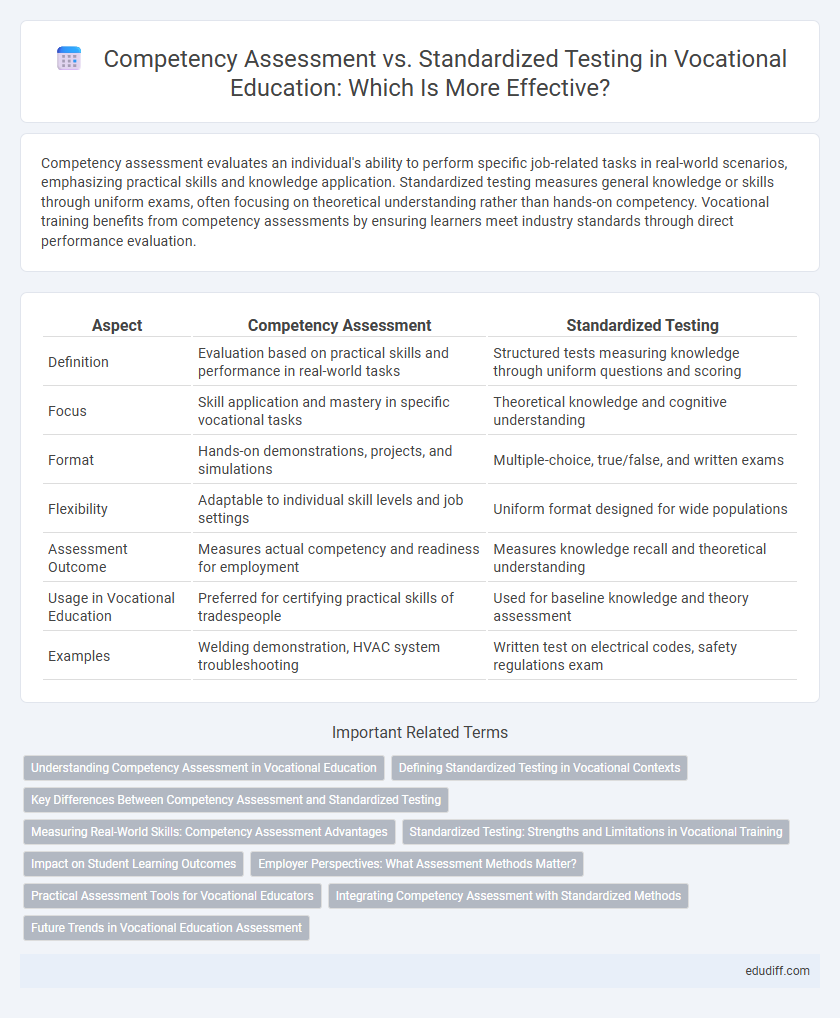Competency assessment evaluates an individual's ability to perform specific job-related tasks in real-world scenarios, emphasizing practical skills and knowledge application. Standardized testing measures general knowledge or skills through uniform exams, often focusing on theoretical understanding rather than hands-on competency. Vocational training benefits from competency assessments by ensuring learners meet industry standards through direct performance evaluation.
Table of Comparison
| Aspect | Competency Assessment | Standardized Testing |
|---|---|---|
| Definition | Evaluation based on practical skills and performance in real-world tasks | Structured tests measuring knowledge through uniform questions and scoring |
| Focus | Skill application and mastery in specific vocational tasks | Theoretical knowledge and cognitive understanding |
| Format | Hands-on demonstrations, projects, and simulations | Multiple-choice, true/false, and written exams |
| Flexibility | Adaptable to individual skill levels and job settings | Uniform format designed for wide populations |
| Assessment Outcome | Measures actual competency and readiness for employment | Measures knowledge recall and theoretical understanding |
| Usage in Vocational Education | Preferred for certifying practical skills of tradespeople | Used for baseline knowledge and theory assessment |
| Examples | Welding demonstration, HVAC system troubleshooting | Written test on electrical codes, safety regulations exam |
Understanding Competency Assessment in Vocational Education
Competency assessment in vocational education evaluates practical skills and job-specific abilities through hands-on demonstrations and real-world tasks, ensuring learners meet industry standards. Unlike standardized testing, which measures theoretical knowledge through uniform exams, competency assessments provide a direct measure of performance in authentic vocational contexts. This approach aligns training outcomes with employer expectations, enhancing workforce readiness and skill proficiency.
Defining Standardized Testing in Vocational Contexts
Standardized testing in vocational contexts involves uniform assessments designed to measure specific skills and knowledge aligned with industry standards. These tests ensure consistency and fairness by providing objective benchmarks for evaluating competencies across diverse candidate populations. Their structured format supports certification processes and workforce readiness by validating proficiency in essential vocational tasks.
Key Differences Between Competency Assessment and Standardized Testing
Competency assessment evaluates a learner's ability to perform specific tasks and demonstrate skills in real-world contexts, emphasizing practical application and mastery. Standardized testing measures knowledge through uniform tests scored objectively, focusing on comparing results across large populations using pre-established benchmarks. Key differences include the assessment format, with competency assessment being performance-based and standardized testing being multiple-choice or written exams, and their respective goals: skill validation versus knowledge measurement.
Measuring Real-World Skills: Competency Assessment Advantages
Competency assessments prioritize measuring real-world skills by evaluating practical abilities and job-specific tasks, offering a more accurate reflection of a learner's readiness for the vocational workforce. Unlike standardized testing, competency assessments provide personalized feedback and identify skill gaps that directly impact job performance. This approach enhances workforce development by aligning assessment outcomes with industry standards and employer expectations.
Standardized Testing: Strengths and Limitations in Vocational Training
Standardized testing in vocational training provides objective benchmarks to measure technical skills and knowledge across diverse learners, ensuring consistency in certification and qualifications. Its strengths include scalability, ease of administration, and alignment with industry standards, facilitating employer trust in candidate competencies. However, limitations arise from its inability to fully capture practical, hands-on skills and adaptability in dynamic work environments, potentially overlooking critical real-world problem-solving abilities.
Impact on Student Learning Outcomes
Competency assessment provides a personalized evaluation method that directly measures a student's abilities and practical skills, leading to improved engagement and retention of knowledge. Standardized testing offers uniform benchmarks that facilitate comparison across diverse student populations but may overlook individual competencies relevant to vocational tasks. Balancing both approaches can enhance student learning outcomes by ensuring mastery of essential skills while maintaining consistent academic standards.
Employer Perspectives: What Assessment Methods Matter?
Employers in vocational sectors prioritize competency assessments over standardized testing as they provide a practical demonstration of job-specific skills and real-world problem-solving abilities. Competency assessments offer actionable insights into candidates' readiness to perform tasks essential to the role, whereas standardized tests often measure theoretical knowledge unrelated to actual job performance. Hiring managers seek assessment methods that align with workplace demands to ensure workforce effectiveness and reduce training costs.
Practical Assessment Tools for Vocational Educators
Competency assessment provides vocational educators with practical tools that evaluate hands-on skills and real-world job performance, ensuring learners meet industry standards beyond theoretical knowledge. Standardized testing often measures general knowledge through uniform metrics, but competency assessments utilize simulations, portfolios, and skill demonstrations tailored to specific trades or professions. These practical assessment tools enhance the accuracy of skill validation, promoting workplace readiness and aligning training outcomes with occupational requirements.
Integrating Competency Assessment with Standardized Methods
Integrating competency assessment with standardized testing creates a comprehensive evaluation framework that measures both practical skills and theoretical knowledge essential in vocational training. This hybrid approach enhances the accuracy of performance appraisal by aligning hands-on competencies with industry standards and standardized metrics. Combining these methods improves certification processes, ensuring learners meet required skill levels while supporting personalized learning pathways and workforce readiness.
Future Trends in Vocational Education Assessment
Future trends in vocational education assessment emphasize the integration of competency assessment with digital technologies such as AI-driven analytics and virtual simulations to provide personalized learning feedback. Growing reliance on real-time skills validation through adaptive testing platforms supports dynamic competency frameworks aligned with industry needs. Blockchain technology is increasingly explored to securely verify and share credentialing, enhancing transparency and employer trust in vocational qualifications.
Competency Assessment vs Standardized Testing Infographic

 edudiff.com
edudiff.com